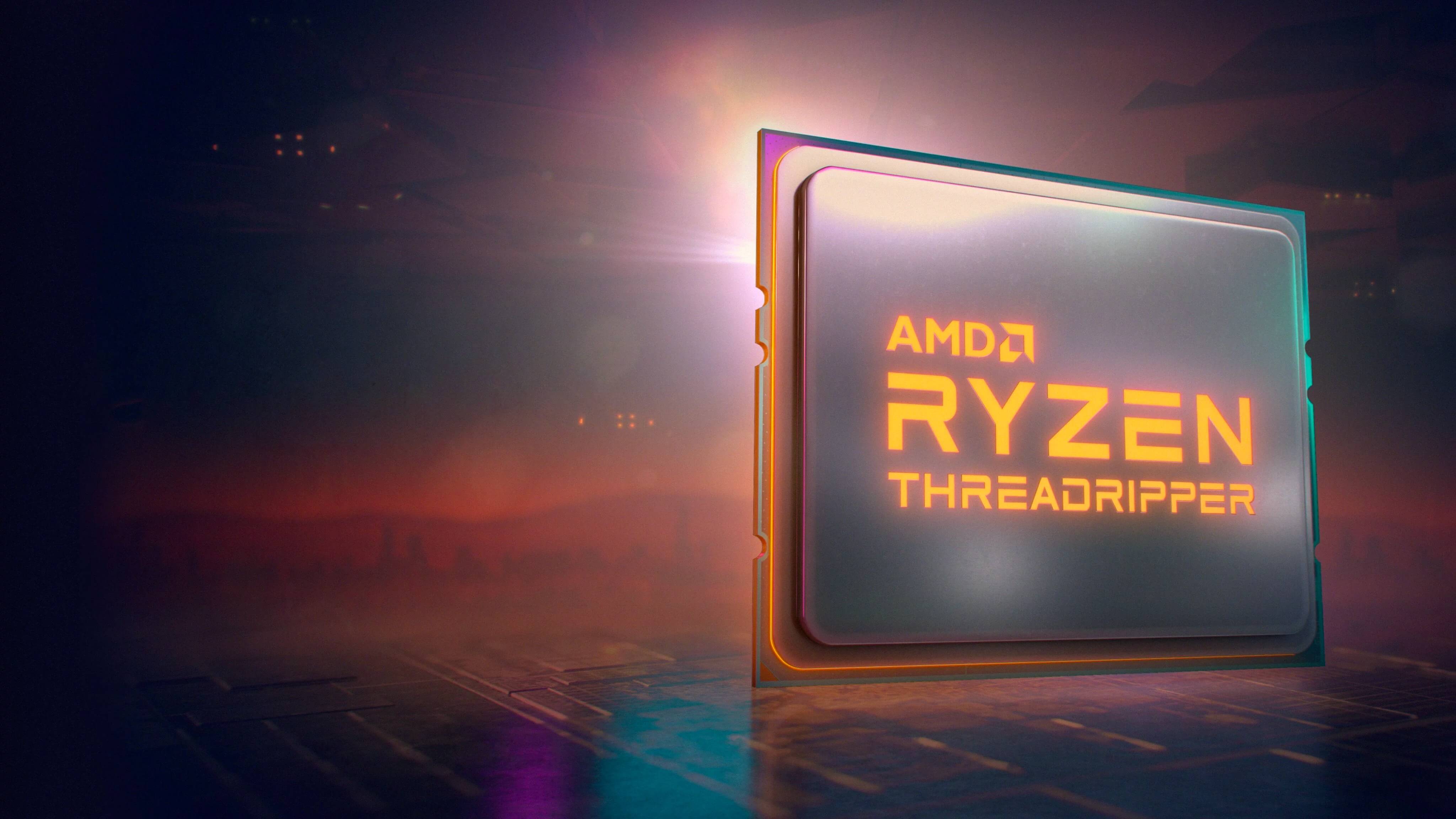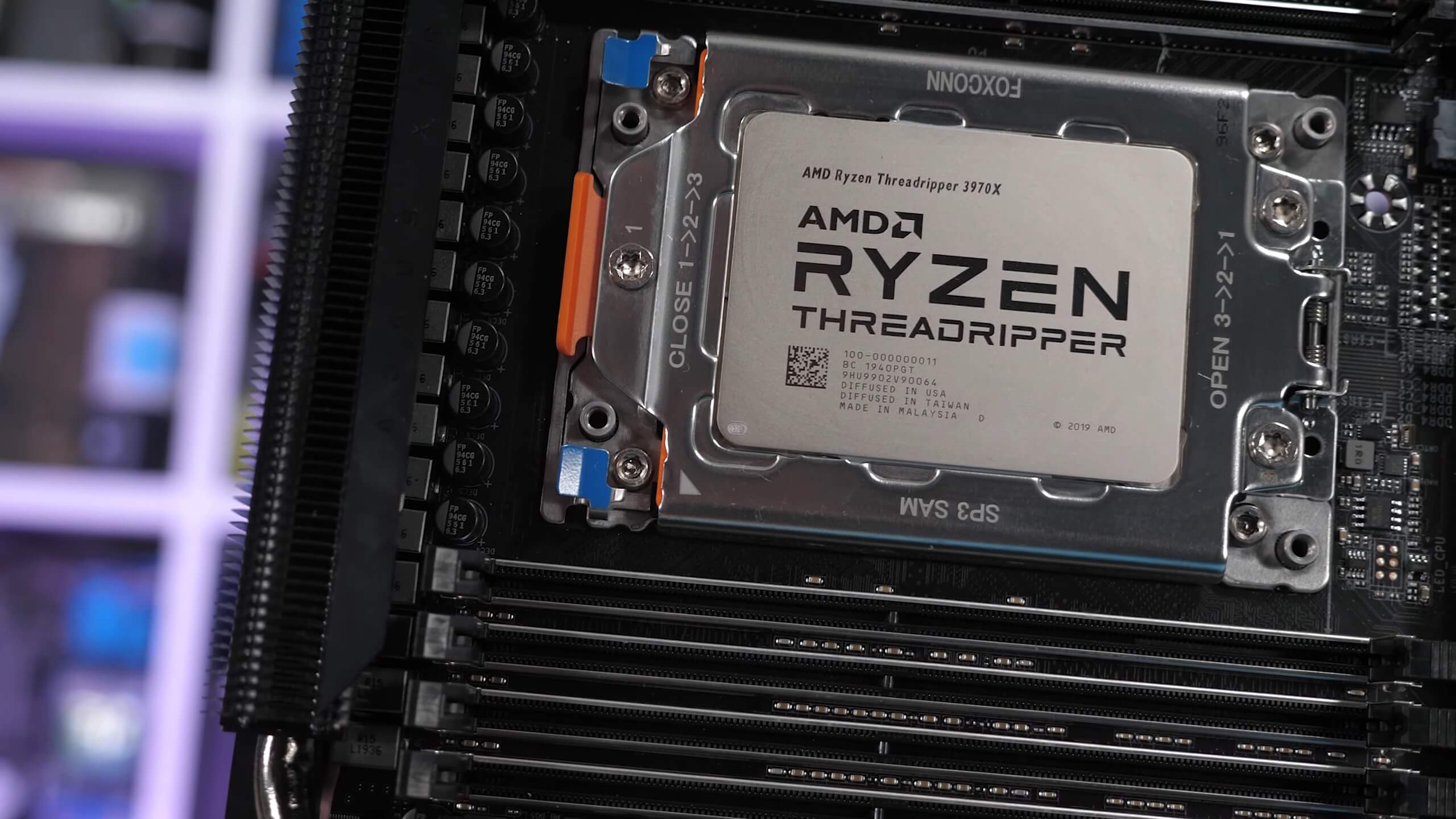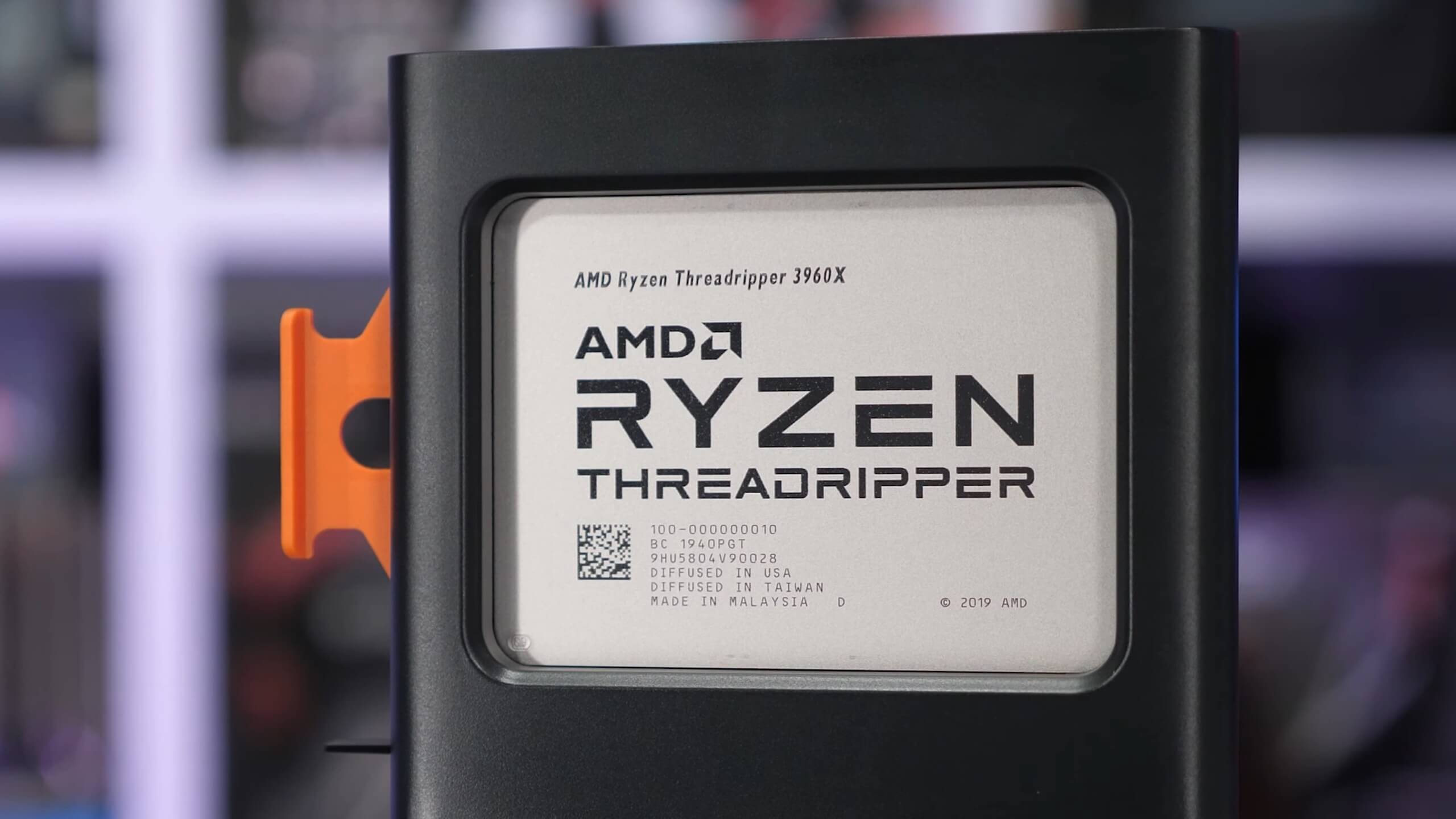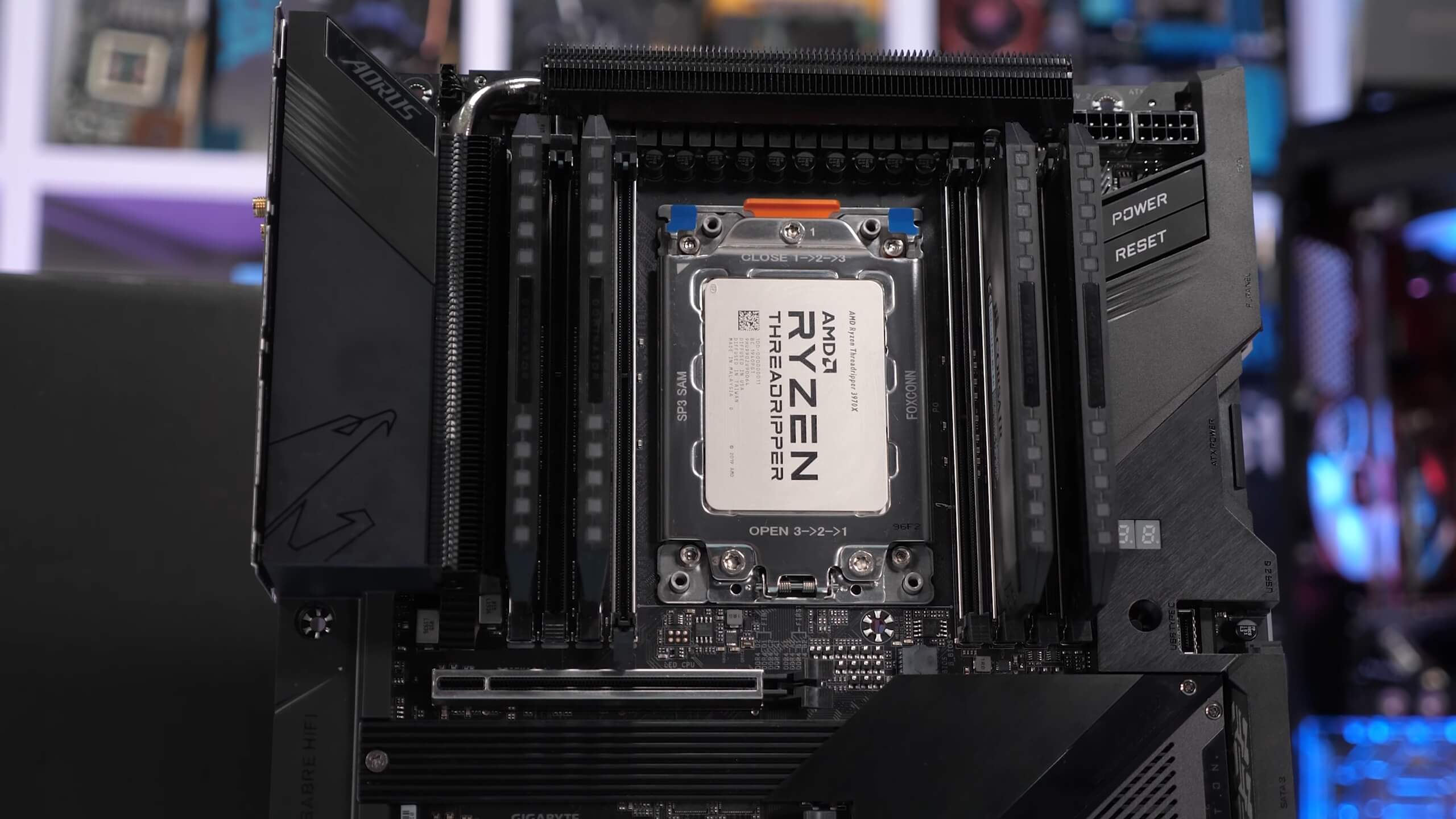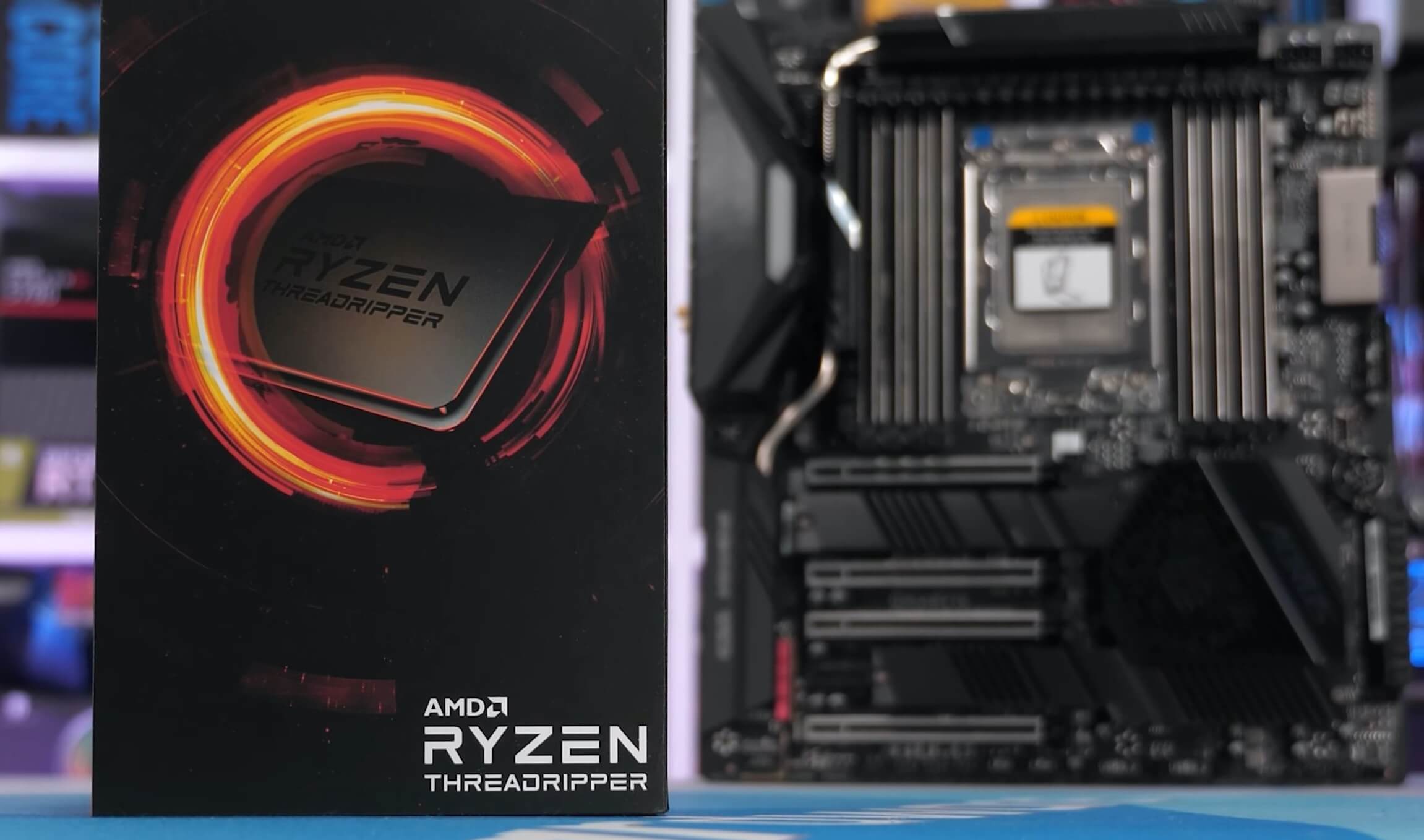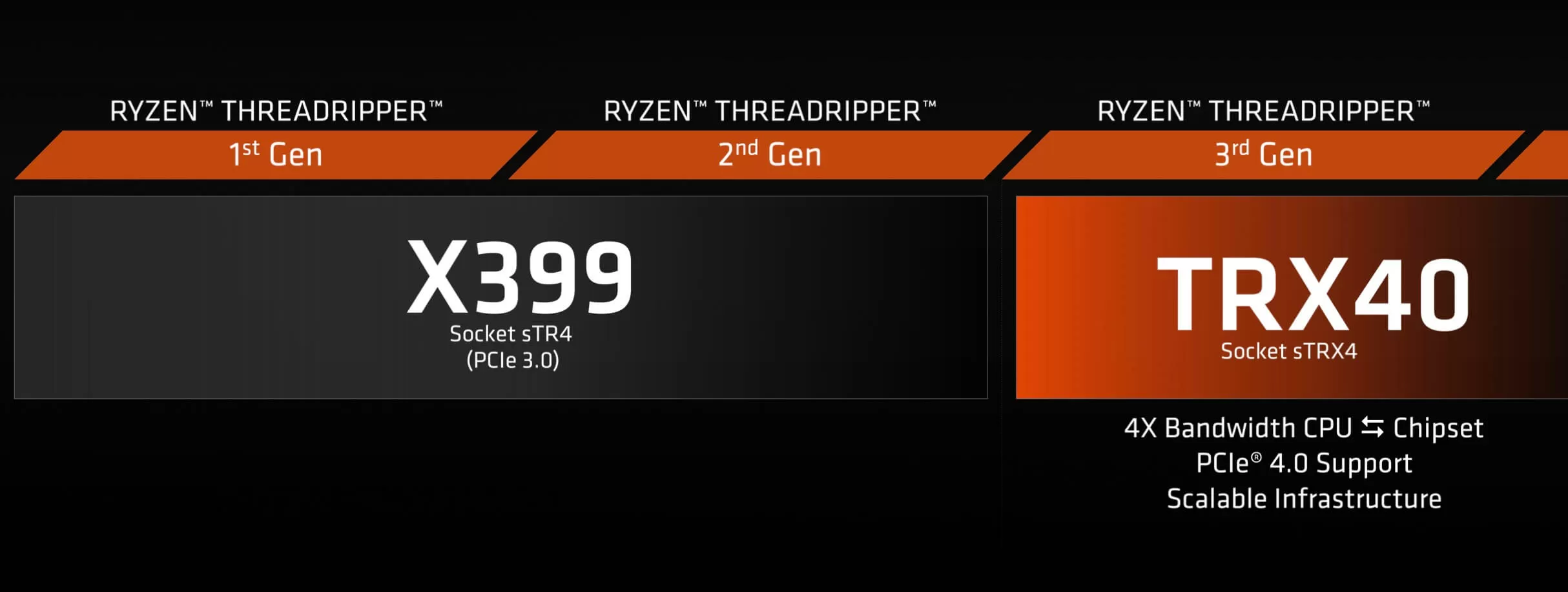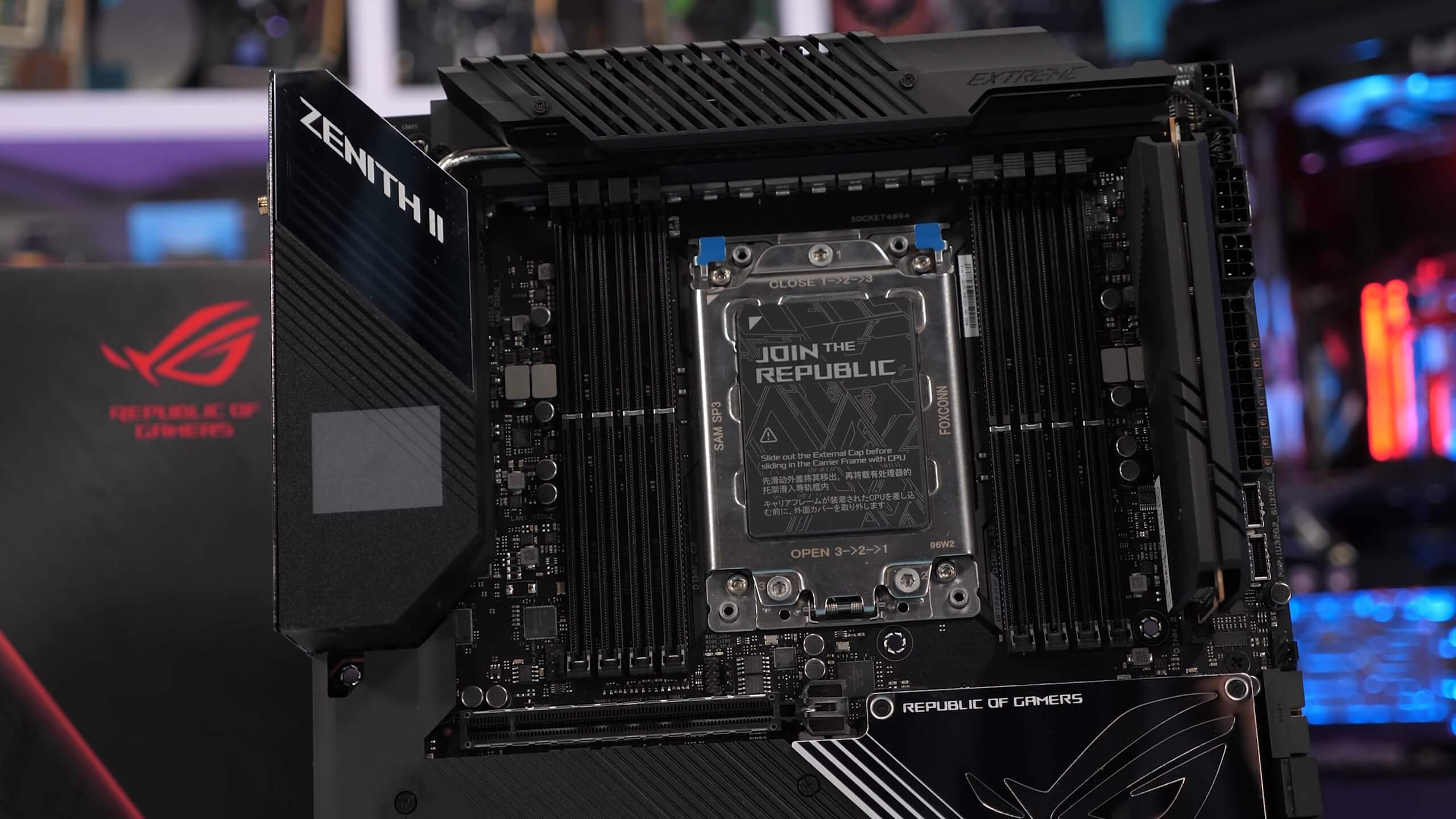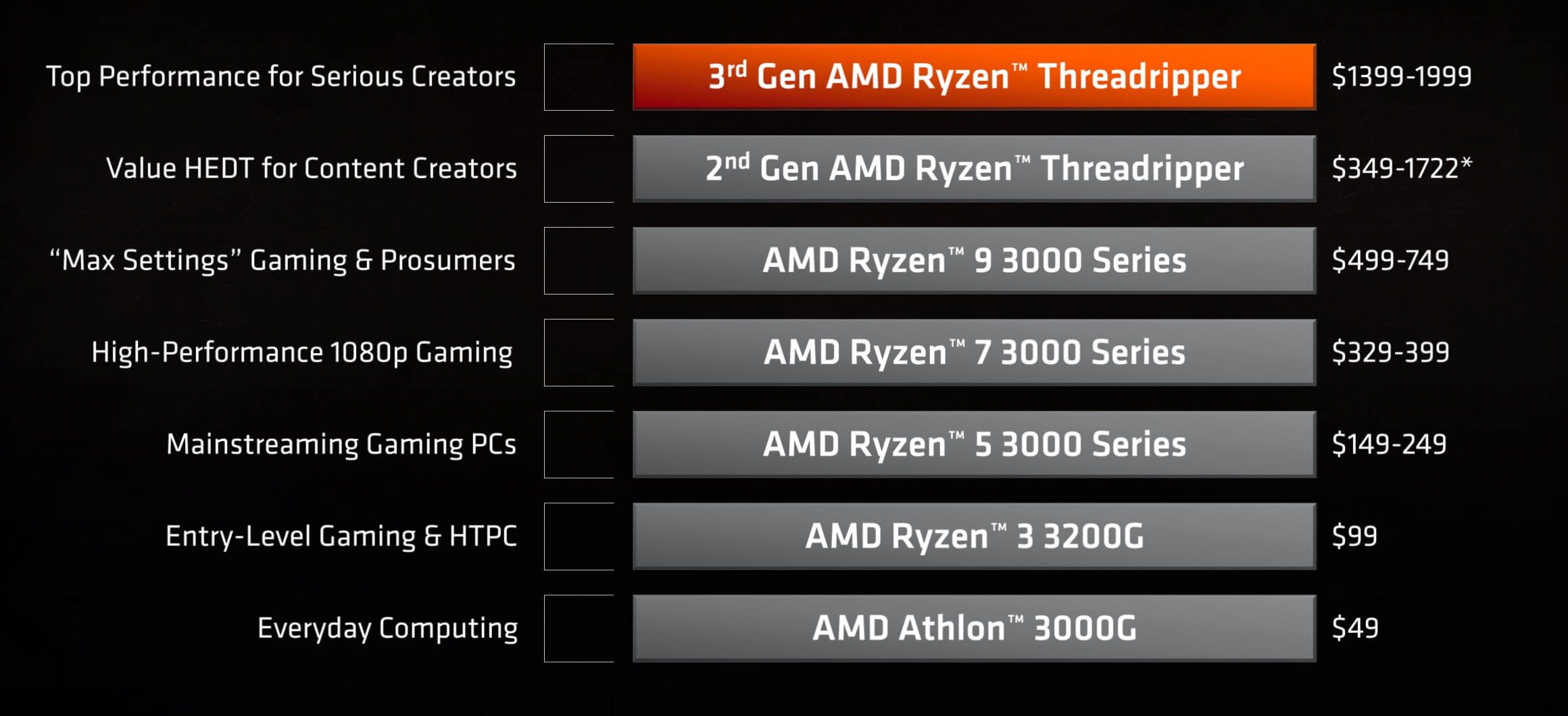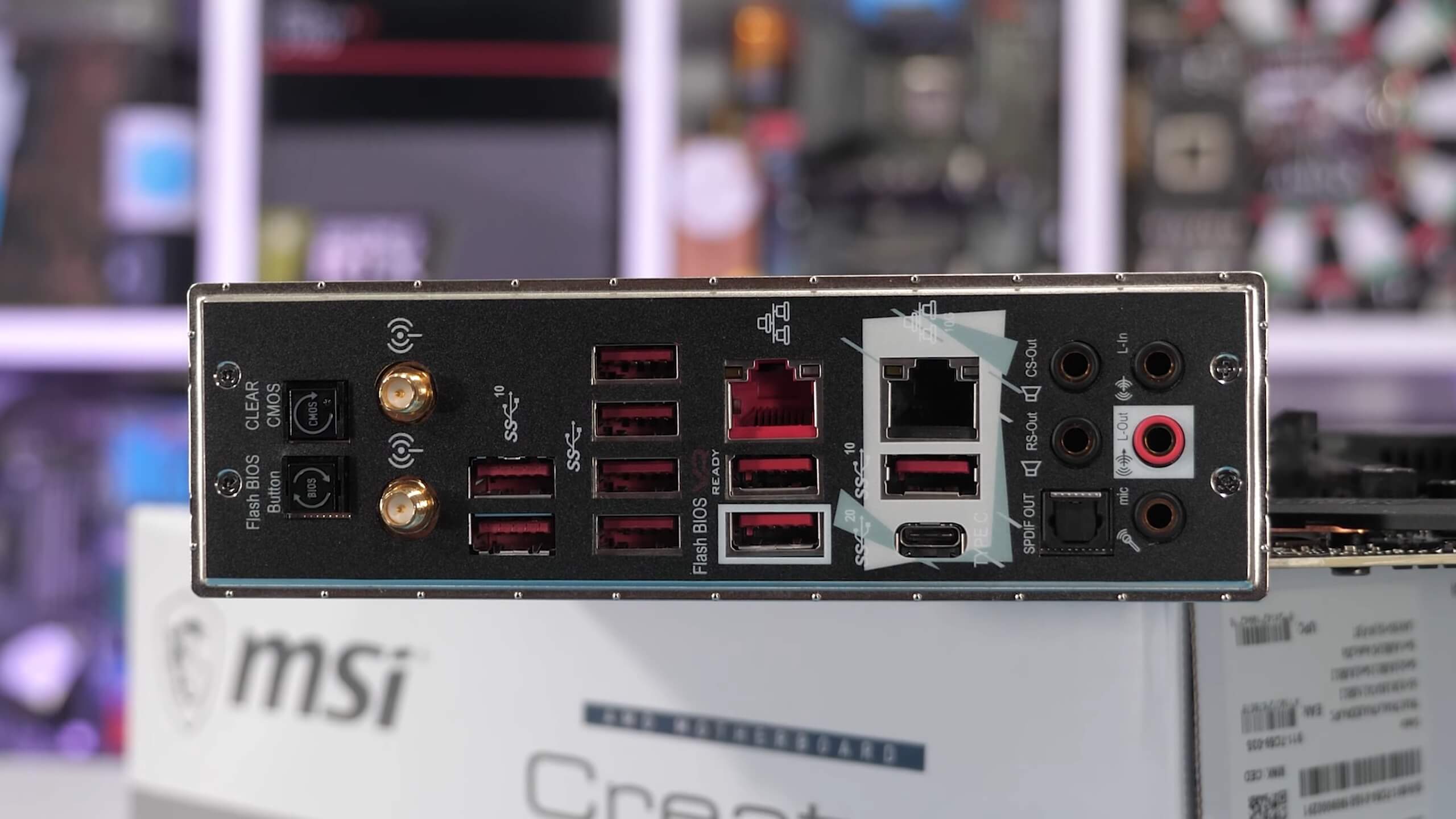The latest 32-core and 24-core high-end desktop parts from AMD have now landed. We've known about the specs for a while, so we'll waste little time talking what we already knew on paper, and get the ball rolling with actual performance figures. Yes, we've benchmarked the heck out of these new processors.
The Ryzen Threadripper 3970X is a 32-core, 64-thread processor with a massive 128MB L3 cache, it runs at a base frequency of 3.7 GHz with a boost frequency of 4.5 GHz. It's priced at $2,000 making it AMD's most expensive desktop CPU ever. It's also currently the most expensive desktop CPU on the market.
If that's a tad too rich, maybe the Ryzen Threadripper 3960X which costs $1,400 is more the go: the 24-core, 48-thread CPU packs the same 128MB L3 cache and clocks anywhere from 3.8 GHz to 4.5 GHz.
For testing third-gen Threadripper we've lined up the Gigabyte TRX40 Aorus Xtreme. Comparisons we'll be drawn across other product lines including the Ryzen 9 3950X, 3900X and Ryzen 7 3800X, all tested with the Gigabyte X570 Aorus Xtreme. Then we have the MSI X399 Creator for the 2nd-gen Threadripper 2990WX, 2950X and 2920X.
All motherboards were up to date with the latest BIOS revision, tested using 32GB of Corsair Dominator Platinum RGB DDR4-3200 CL14 memory and the Corsair HydroX loop with a 360mm radiator. We realize performance in some workloads might be higher with DDR4-3600 CL16 memory, but in order to make this an apples to apples test, all platforms used the same spec memory. AMD sampled us a 64GB kit of Corsair Dominator Platinum RGB DDR4-3600 memory, which we plan to use for future reviews.
On the Intel front, the Cascade Lake-X Core i9-10980XE and Skylake-X Core i9-9920X were tested on the Gigabyte X299 Aorus Gaming 9. Then the mainstream 8th and 9th-gen Intel Core processors were benchmarked on the Gigabyte Z390 Aorus Ultra, but cooled using the Corsair Hydro H115i 280mm AIO cooler. Please note the Intel CPUs are not TDP restricted, so we're showing the best case scenario for out of the box performance. Finally, the graphics card of choice was the MSI RTX 2080 Ti Trio. With that covered, let's get into the benchmark results.
Benchmarks
Starting with Cinebench R20, wow, just wow. The Threadripper 3960X produced a score of 13711 pts, that's a 22% increase over AMD's previous 32-core Threadripper part and a whopping 56% faster than the Core i9-10980XE. Again we see why Intel has continuously tried to downplay the relevance of Cinebench, a benchmark that's based on a real-world rendering application.
Remember the 3960X has 33% more cores than the 10980XE, and yet it's over 50% faster in this test. But what's truly amazing is the 17000 pts score of the 3970X, not only does that make it 24% faster than the 24-core model, but also 94% faster than the 10980XE, though it does cost twice as much.

Cinebench was one of the few Windows applications where the 2990WX crushed it, but we're looking at a 52% performance boost with the 3970X, incredible stuff.
Conversely, single core performance is an area where the Threadripper 2990WX sucked, and the 2920X and 2950X weren't much better. The new 3rd-gen models correct this in a big way. The 3970X and 3960X both scored 520 pts which puts them slightly ahead of the Ryzen 9 3900X and Core i9-9900K. They are also well ahead of the Core i9-10980XE, which hints positively at decent gaming performance (we'll find out in a minute or two).

Moving on to the 7-Zip file manager test, compression performance hasn't been a strong showing for AMD, but the 3970X and 3960X crushed it. The 24-core 3960X was almost 40% faster than the 10980XE and the 3970X about 50% faster. The takeaway here is how much better the 3rd-gen 32-core model is compared to the 2nd-gen 2990WX, which can be found at the bottom of the graph.
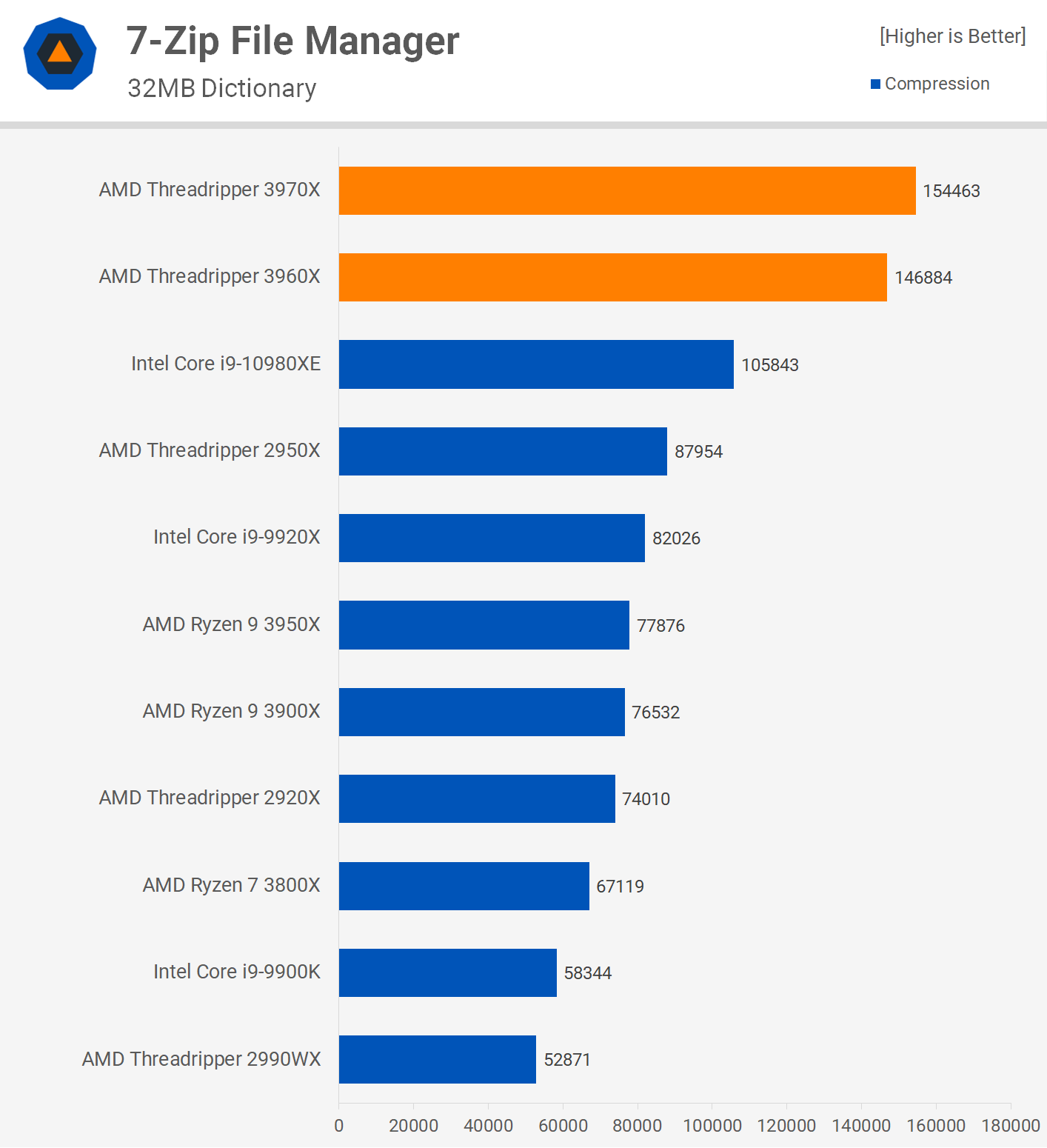
On 7-zip decompression where AMD has done well in the past, the 2990WX jumps up from the bottom of the graph to come in third place, behind the new 3rd-gen Threadripper chips.
The 3970X costs twice as much as the 10980XE, but it's also 126% faster in this workload, even the 3960X was 80% faster than Intel's best. You might have noticed that the Ryzen 9 3950X also beats the 10980XE, so not a great showing for Intel here.
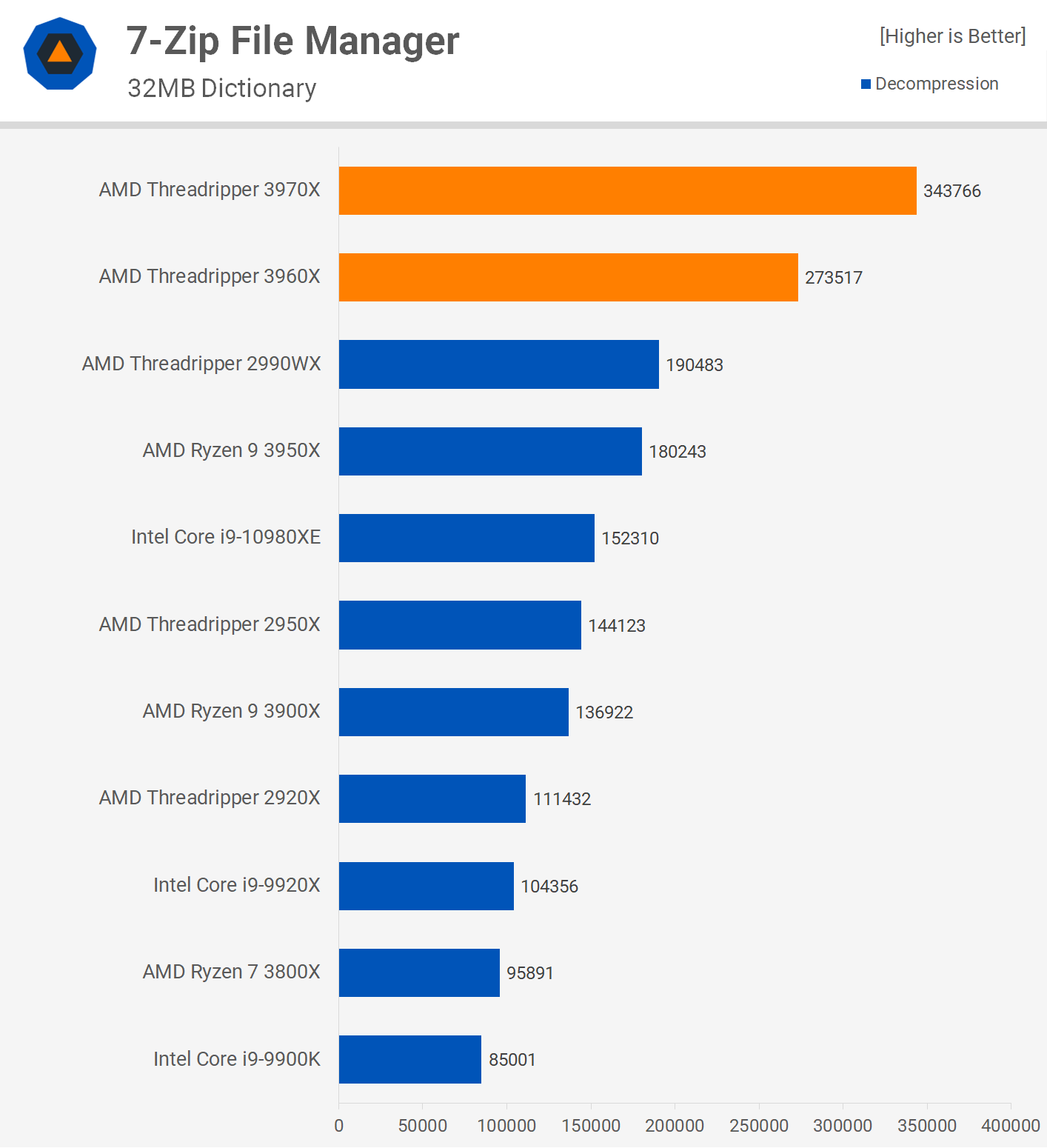
Here's our new Adobe Premiere Pro CC 2020 test using an updated project that uses a lot effects and layers compared to the previous project we used for testing. The Ryzen 9 3950X took 506 seconds to complete this, making it 10 seconds faster than the Core i9-10980XE.
The Threadripper 2990WX was a terrible disappointment in Premiere and it's the reason why we went with the Threadripper 2950X for our video editing rig. The plan was to jump over to the AM4 platform with the 3950X, but after seeing these results it looks like we'll be going with a TRX40 part instead.
The 3960X reduced the render time from the 3950X by 16% and while that's not in line with the 87% price hike for just the processor, if time is money that double digit performance gain will be worth it. The 3970X isn't being fully utilized by Premiere, so the extra cores didn't get much use.
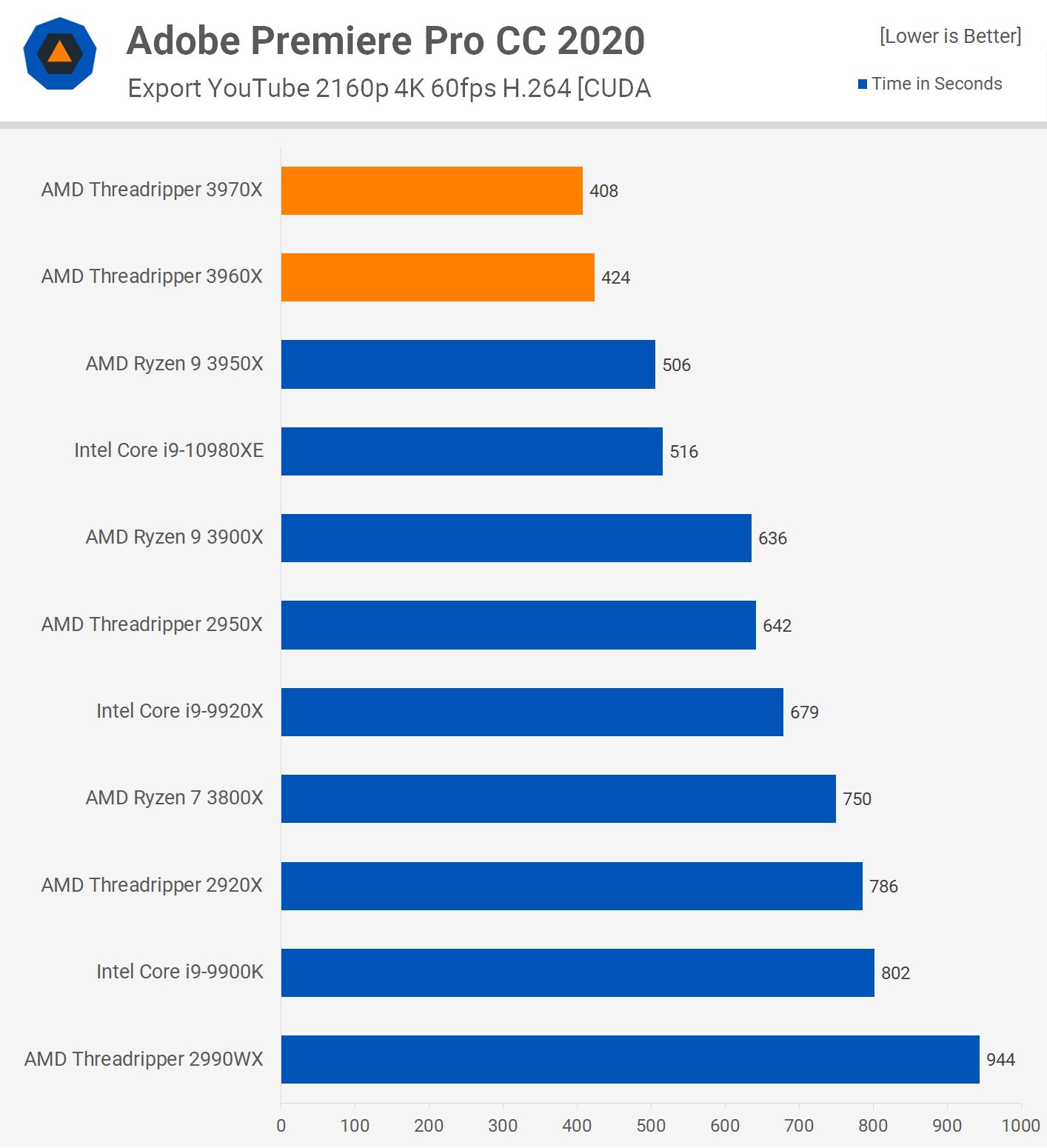
If you'd like to compare your system's encoding performance with Premiere then you can do so using the Puget Systems benchmark. Running the standard export test saw the 3970X score 115 pts, making it 34% faster than the 3950X, which is a much larger margin that what we saw in our workload.
The standard Puget export test features some 8K Red footage, so it's likely this sees Premiere better utilize the core-heavy Threadripper CPUs. When compared to the Core i9-10980XE, the 3970X was 57% faster and the 3960X, 50% faster.
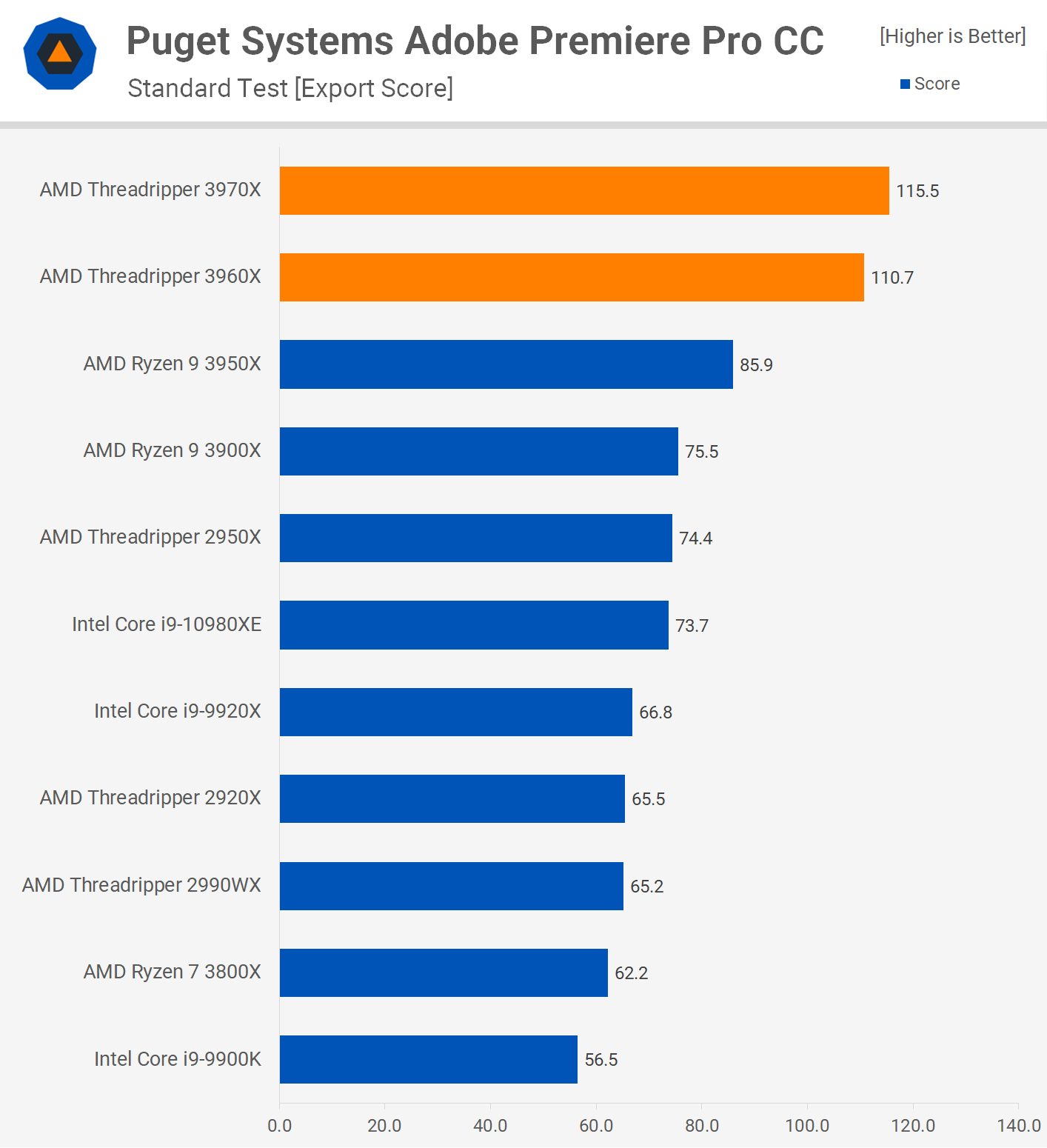
The Puget test also includes a "live playback" score and again you can see that when playing back footage within Premiere the 3970X and 3960X are class leading. These results also show the difference between the Core i9-9900K and Ryzen 9 3900X when editing are minimal.
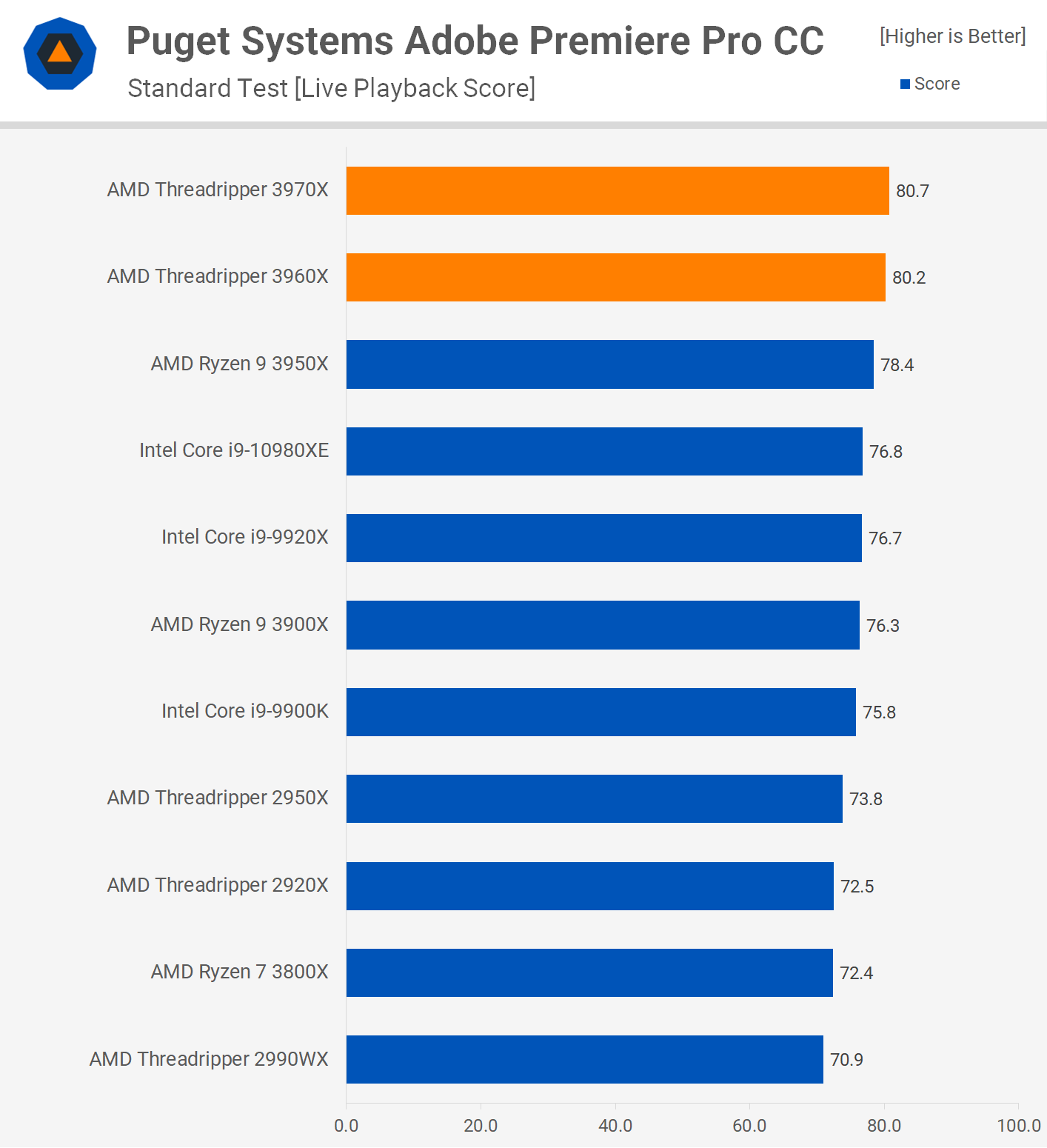
V-Ray is an application benchmark where the 2990WX did reasonably well, it was 20% faster than the 16-core 2950X, for example, but the Core i9-10980X was 11% faster than the 2nd-gen 32-core processor despite offering significantly more cores.
Third-gen Threadripper ups the ante, here the 3970X pushed past the 45,000 mark to beat the 10980XE by a whopping 62% and AMD's 2990WX by 81%. The 3960X was also 32% faster than the 1090XE and 40% faster than the Ryzen 9 3950X.
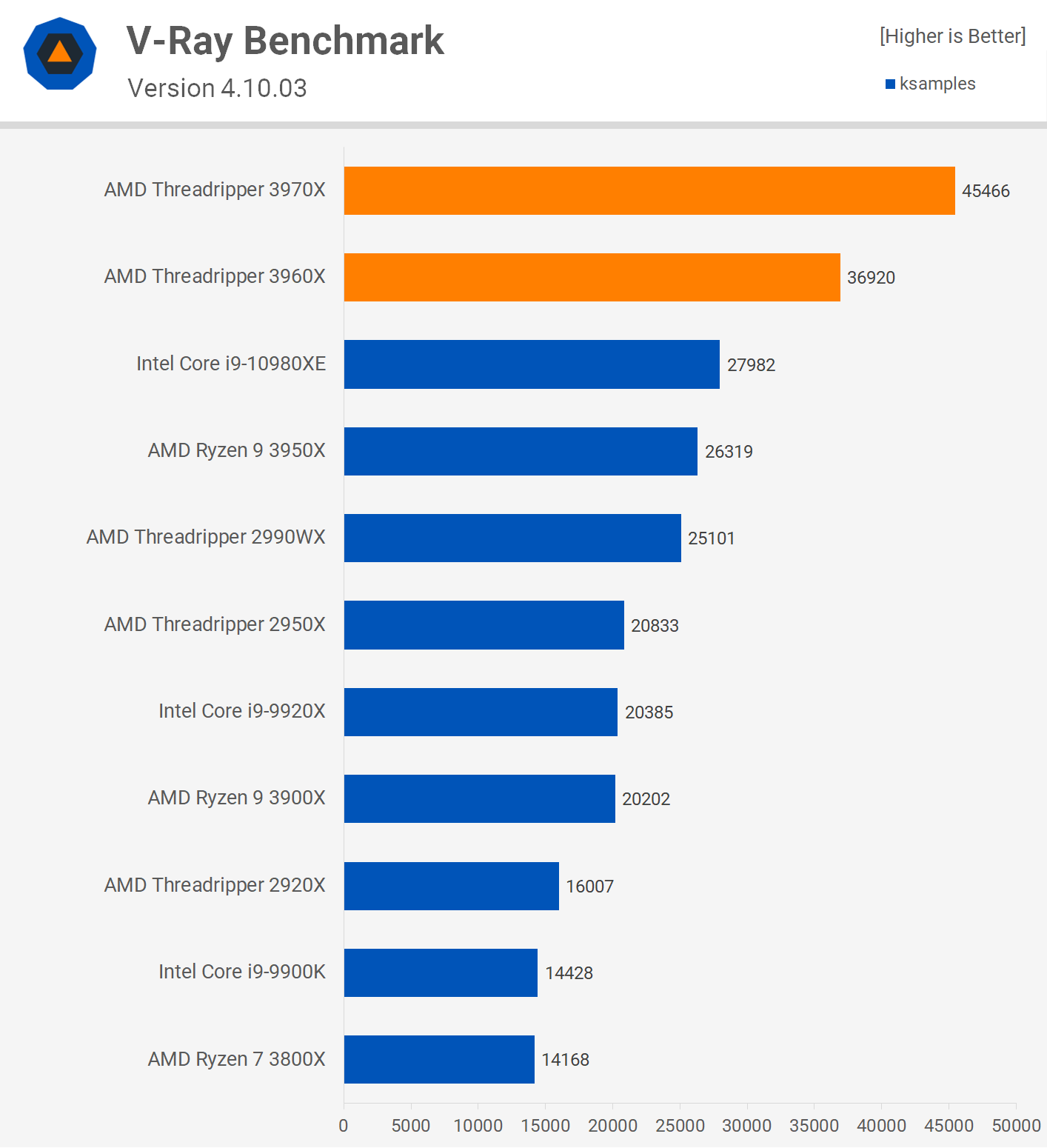
The Threadripper 2990WX also did well in Corona, comfortably beating Intel's best. The new 3960X was able to reduce the completion time by 16% from the 2990WX, while the 3970X reduced it by 23%. Those margins don't justify the price premium, but again if time's money, then it won't be hard to justify the expense.

The Blender Open Data results look much like what we just saw with Corona and V-Ray. Here the 3970X was 42% faster than the 2990WX, reducing the render time by almost 30%.
The 3970X was also 101% faster than Intel's best, the Core i9-10980XE. AMD's high-end desktop processor is now 100% faster than Intel, in a popular real-world application, just think what the 64-core 3990X is going to do early next year when it's released. It also gives AMD enough cred to charge those prices.
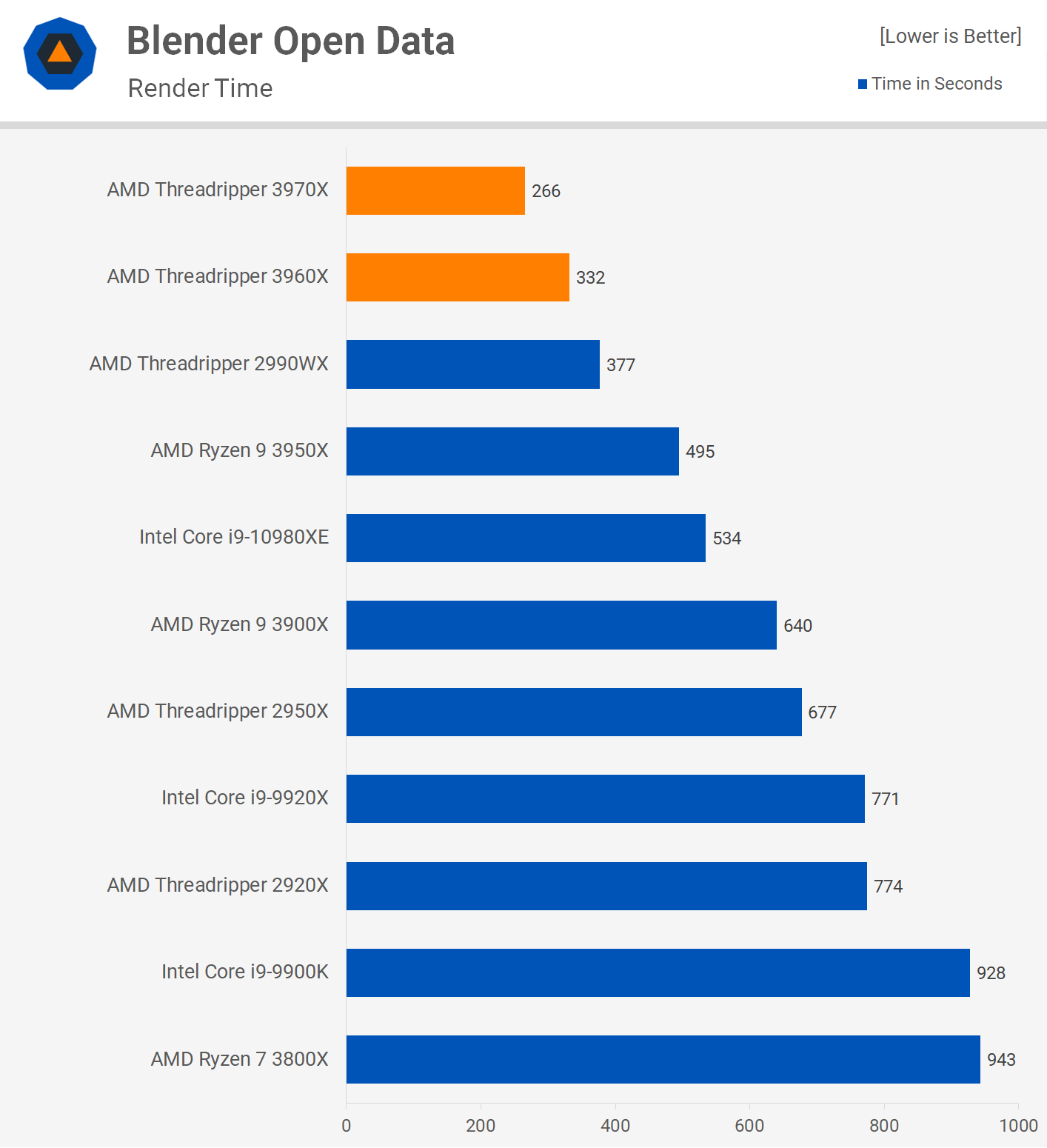
Power Consumption
As power efficient as 7nm Zen 2 is, a 100% performance boost over the 10980XE will require some serious power usage. Both models pushed total system usage to around 430-440 watts, so that explains why every TRX40 motherboard has a massive VRM.
Roughly a 20% power increase from the 2990WX isn't too bad though given how much faster these 3rd-gen Threadripper parts are. Total system consumption was pushed almost 40% higher than the Core i9-10980XE, but for 100% more performance in this particular test, it seems justified.

Gaming Benchmarks
Starting with Battlefield V, both 3rd-gen Threadripper models were able to slightly overcome the Core i9-9900K, at least when looking at the average frame rate.
Usually this is not what you see from workstation-level CPUs – I mean, just look at the 2990WX – but single core performance evidently is an area that AMD has been working hard to optimize for the last few years with every Ryzen iteration. We see a 9% increase in 1% low performance when going from the Ryzen 9 3950X to the Threadripper 3970X.
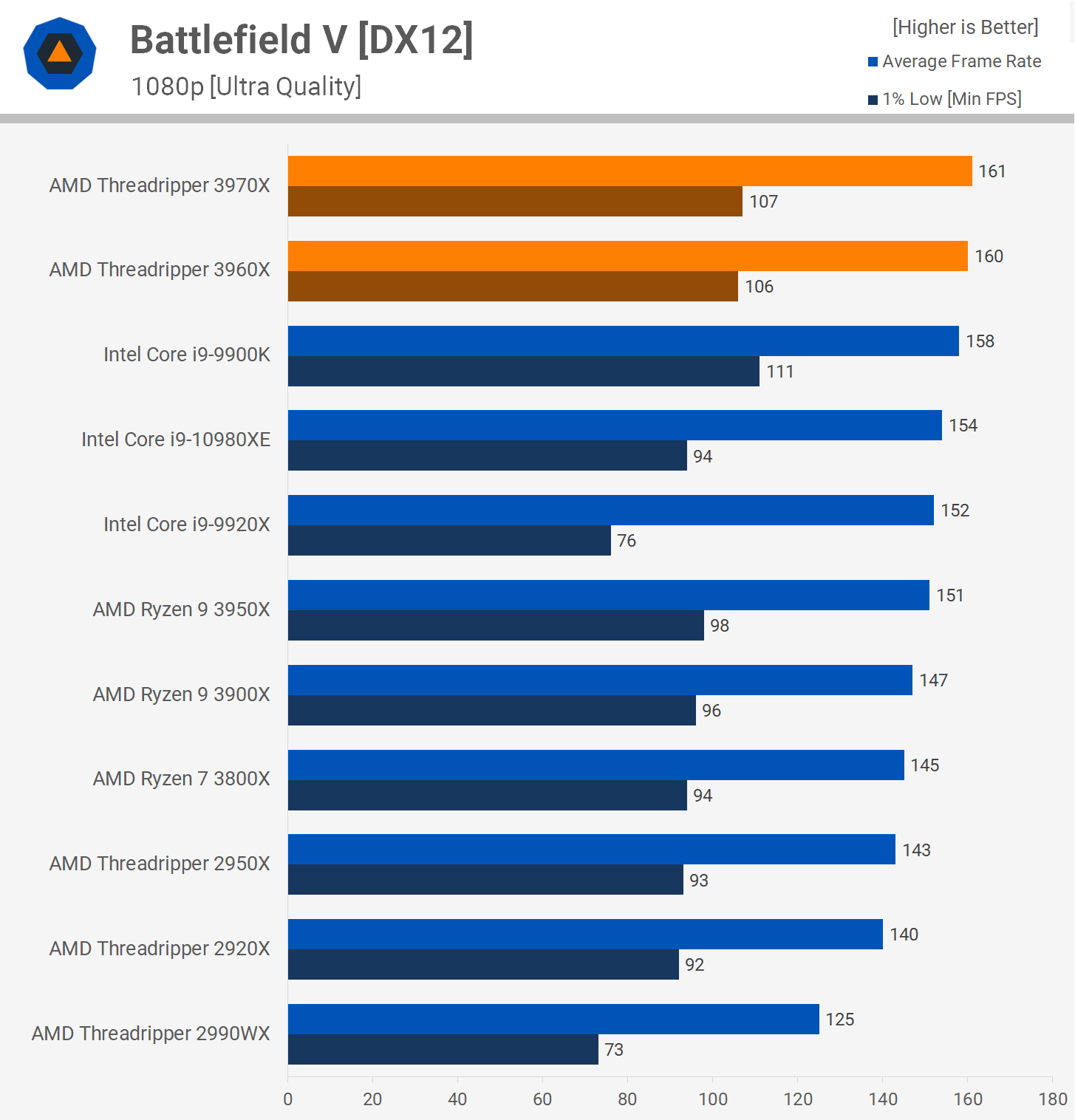
Another title where third-gen Threadripper hits it out of the park is Shadow of the Tomb Raider. Both CPUs were faster than 3rd-gen Ryzen AM4 models. A 20% increase over the 3950X doesn't seem to make sense, personally I expected the 3970X to be roughly on par with the 3950X. After re-testing both the 3970X and 3900X three times, the results were consistent. At first we though the 3970X and its numerous 'better' cores were clocking higher, that could be a contributing factor but that's all it would be, the jump from 4.2 GHz to 4.5 GHz, for example, is just a 7% frequency increase, so a 20% boost in performance can't come from frequency alone.
After monitoring both CPUs side-by-side, the 3970X operating frequency was just 1% higher at 4375 MHz opposed to 4275 MHz for the 3900X. So perhaps it's memory bandwidth or cache capacity that hands the new Threadripper such massive advantage in this title.

This time in The Division 2, both the 3970X and 3960X managed to edge out the 1% low performance of the 9900K, while they managed the same 157 fps on average. This also put them roughly on par with the 3950X and 3900X.
The experience was much the same using the Core i9-10980XE, as the 3970X only boosted average frame rate performance by 5%. When compared to the 2990WX it's remarkable how well these 3rd-gen Threadripper CPUs game.
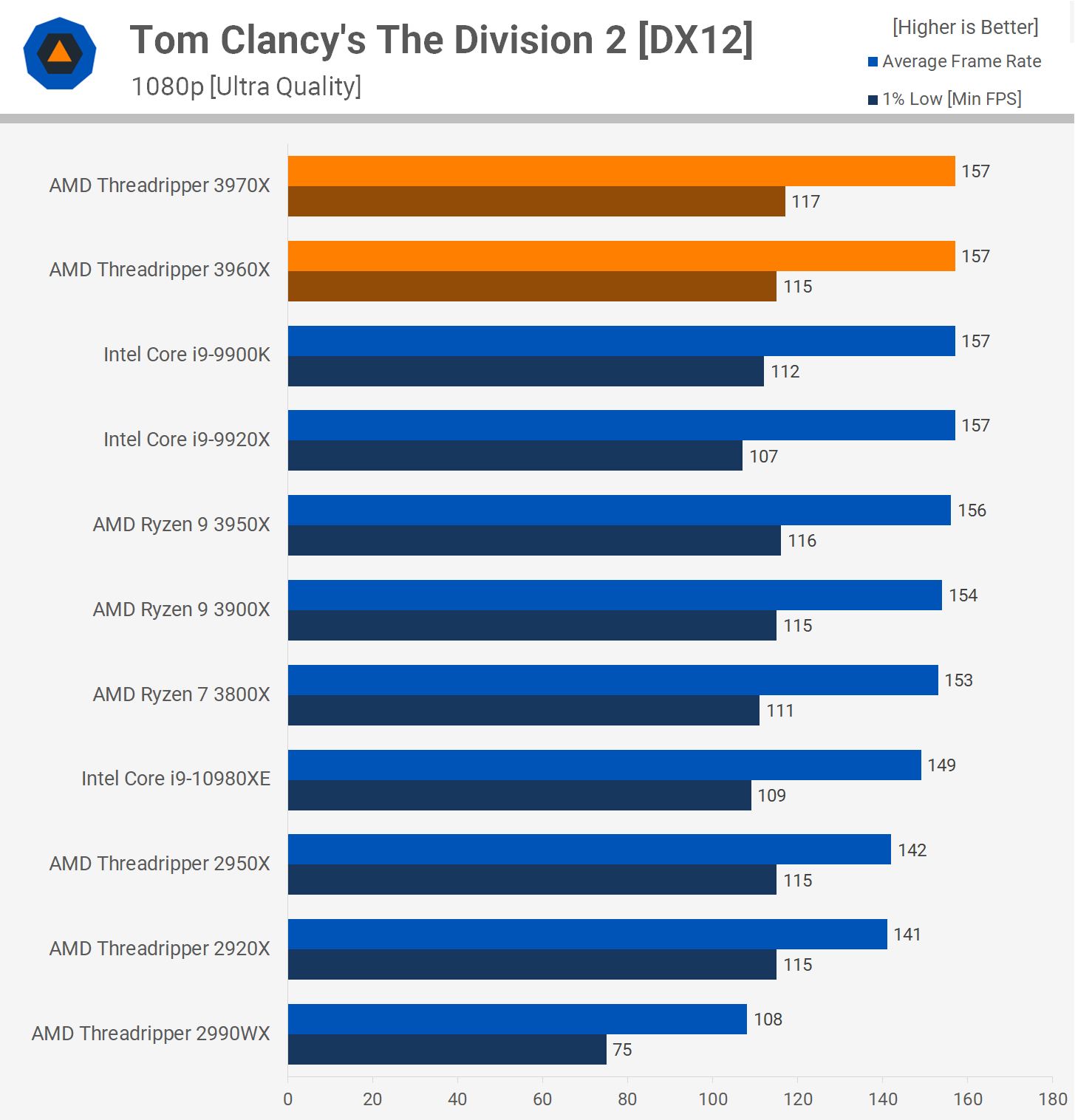
Tom Clancy's Ghost Recon Breakpoint isn't the most CPU demanding game out there, but it's good to see the 3970X and 3960X providing strong performance in this DX11 title.
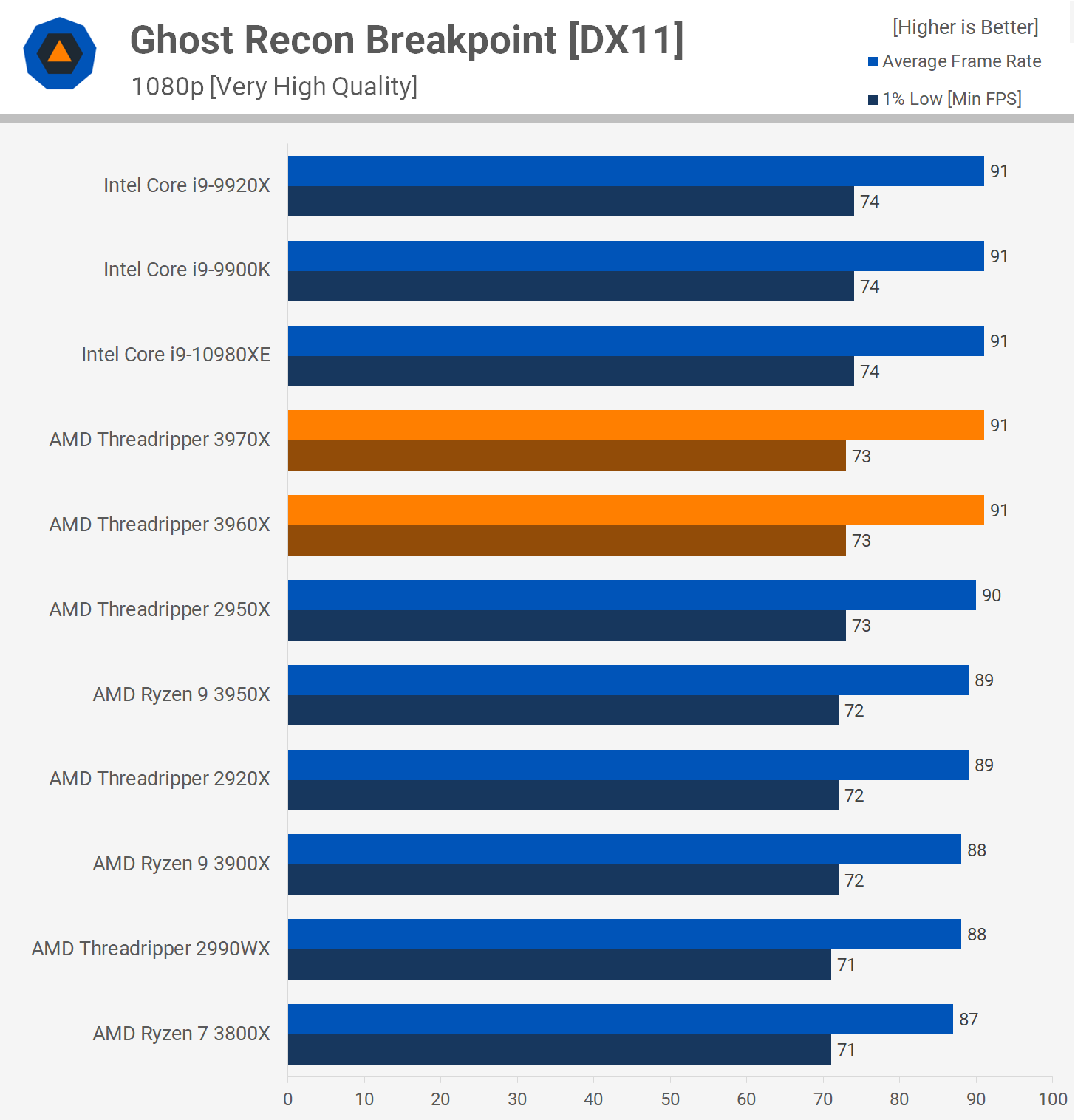
This time when testing with F1 2019, the Ryzen 9 3950X delivered the best result, but the 3rd-gen Threadripper were right up there, at most 3 fps down. Both parts were also faster than the 10980XE, though I doubt you'll notice the difference going from 167 fps on average to 176 fps.

Oddly, performance in Borderlands 3 is a little down on the Ryzen 9 parts. The CPUs are still within what is almost margin or error of the 9900K, which is a good result for these 3rd-gen Threadripper CPUs.
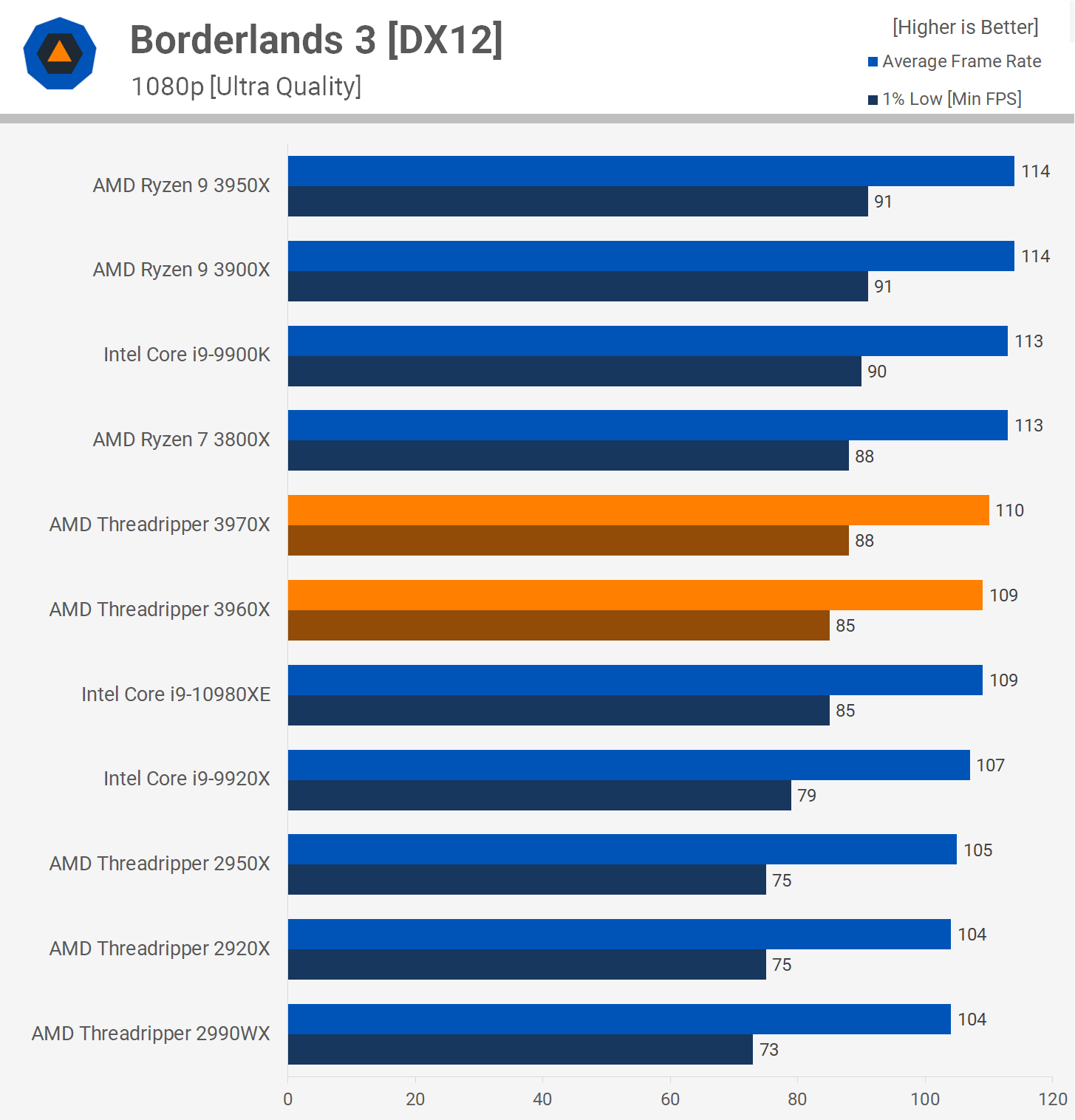
Fortnite in its new DirectX 12 mode had Threadripper trailing the Ryzen 9 parts by a small margin, this time up to 6% slower on average. The Core i9-9900K was also much faster in this popular title.
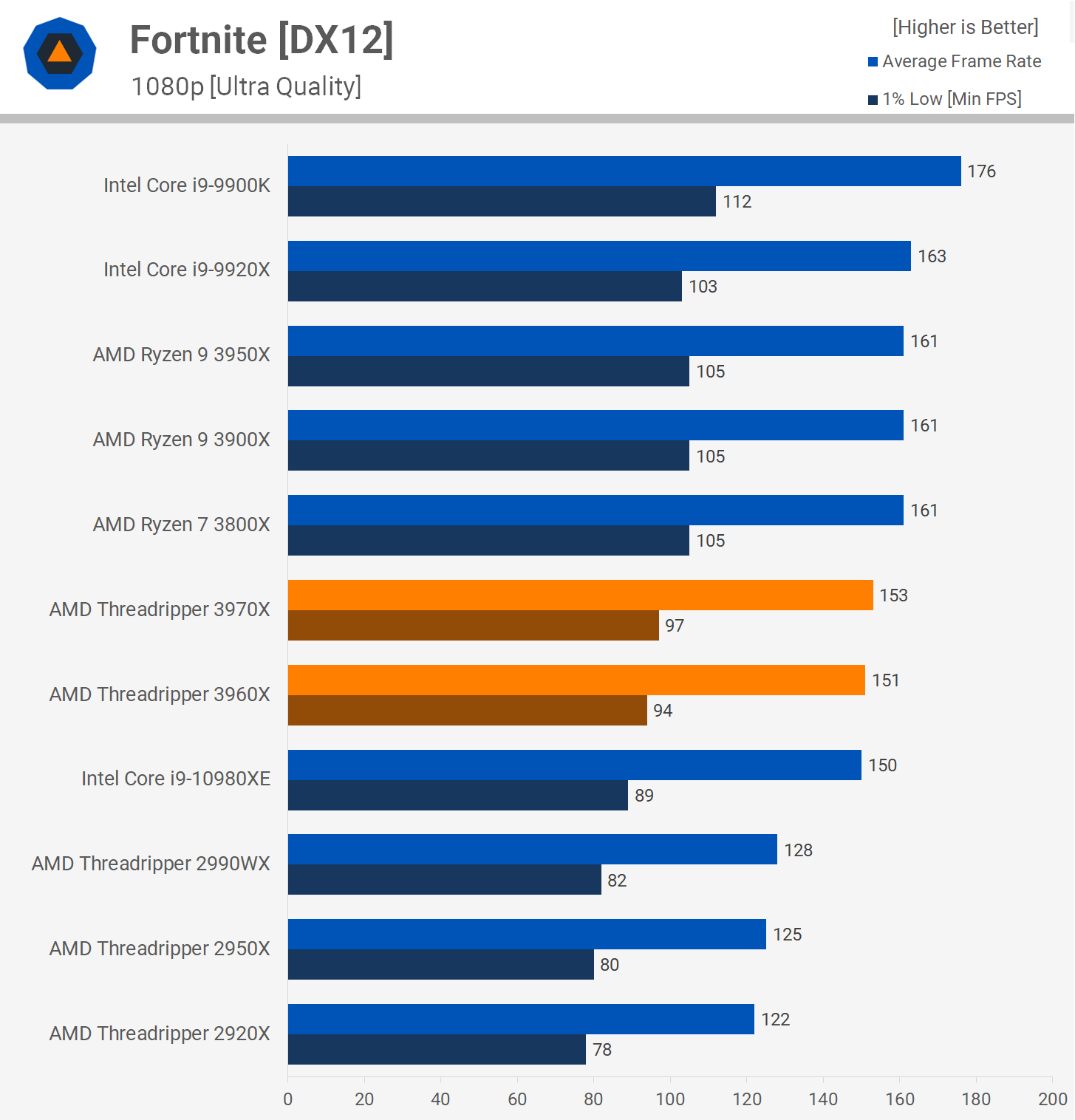
Overclocking and Temperatures
Enabling PBO boosts performance by a slim 3-4%. Then manually overclocking with 1.35v we were able to fit 4.2 GHz on all cores. At 1.4v we could boot into Windows, but the system wasn't 100% stable.
At 4.2 GHz you're looking at a 7% boost in performance for heavy workloads. But since the CPU clocks to around 4.3 GHz when gaming, lighter tasks will take a slight performance hit.
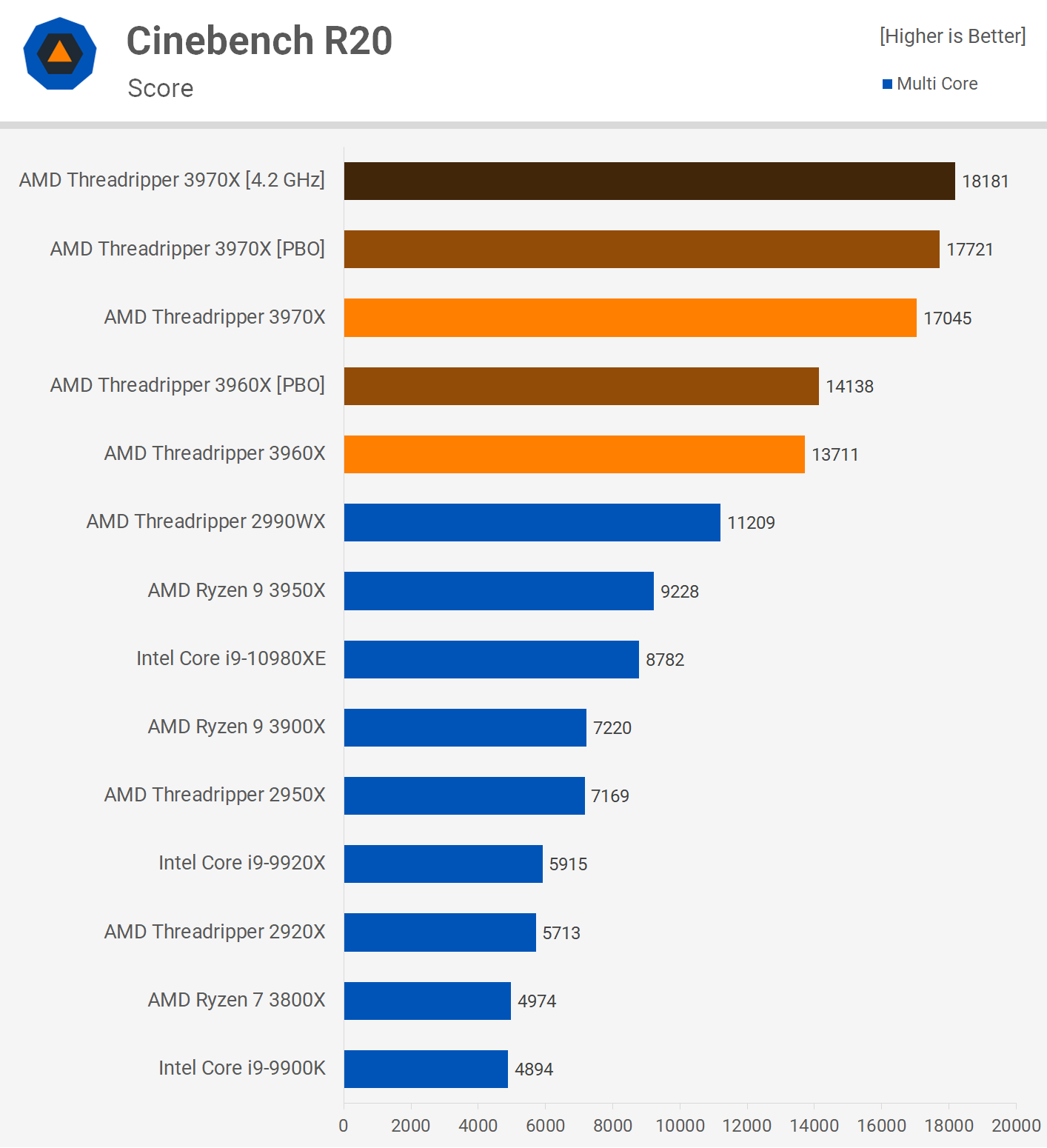
As for operating temps, the 3970X is fairly easy to cool given how much power those 32-cores consume when fully utilized. After an hour of Blender it peaked at 83 C with the Wraith Ripper air cooler in a 21 C room, which is pretty good.
The DeepCool Castle 360EX dropped temps down to just 73 C, though we had to manually cover the entire base of the cooler in paste. With the factory paste it hit 80 C.
Then we have the Corsair HydroX with its larger cold plate it was able to drop the peak load temperature by a further 3 degrees. The 3960X ran 5-6 degrees cooler, so with a decent AIO you'll have no trouble keeping the 24 C processor cool, even after long periods of heavy load.
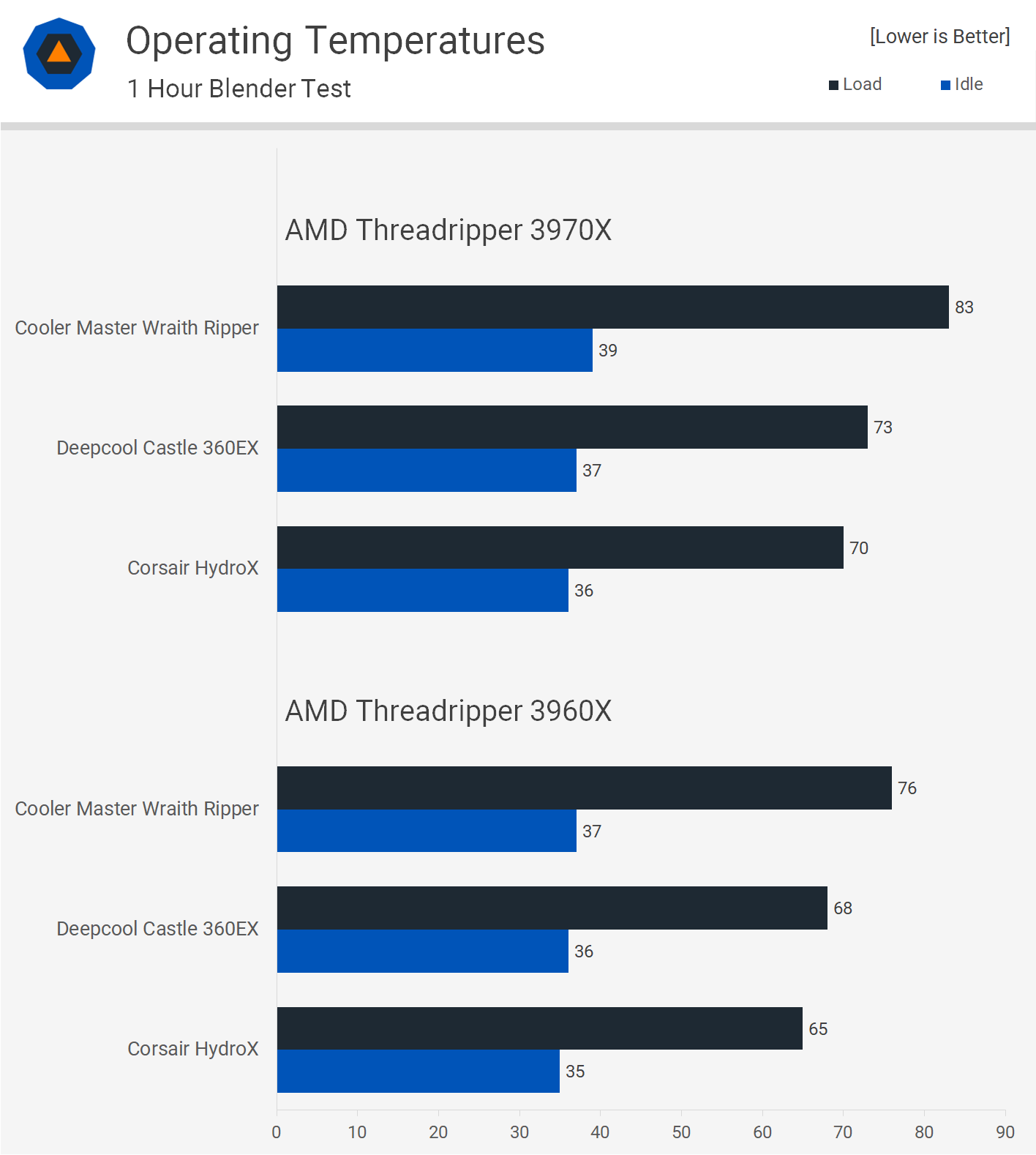
Cache Performance
Here's a look at cache performance, just comparing the Threadripper 3970X to the Ryzen 9 3900X. I wonder if this is why the latest Threadripper CPUs do so well in games like Battlefield V and Shadow of the Tomb Raider relative to the Ryzen 9 parts. Oddly L3 read performance is well down on the 3900X, but we see a 171% increase in write performance.
We also see a 165% increase in L2 read performance and 177% more bandwidth when writing. Then for the L1 cache Threadripper enjoys 152% more bandwidth when reading and 165% more when writing. So the L1 and L2 cache performance has been improved anywhere from 152-177% when compared to the mainstream 12-core 3900X and the same will also apply to the 16-core 3950X.
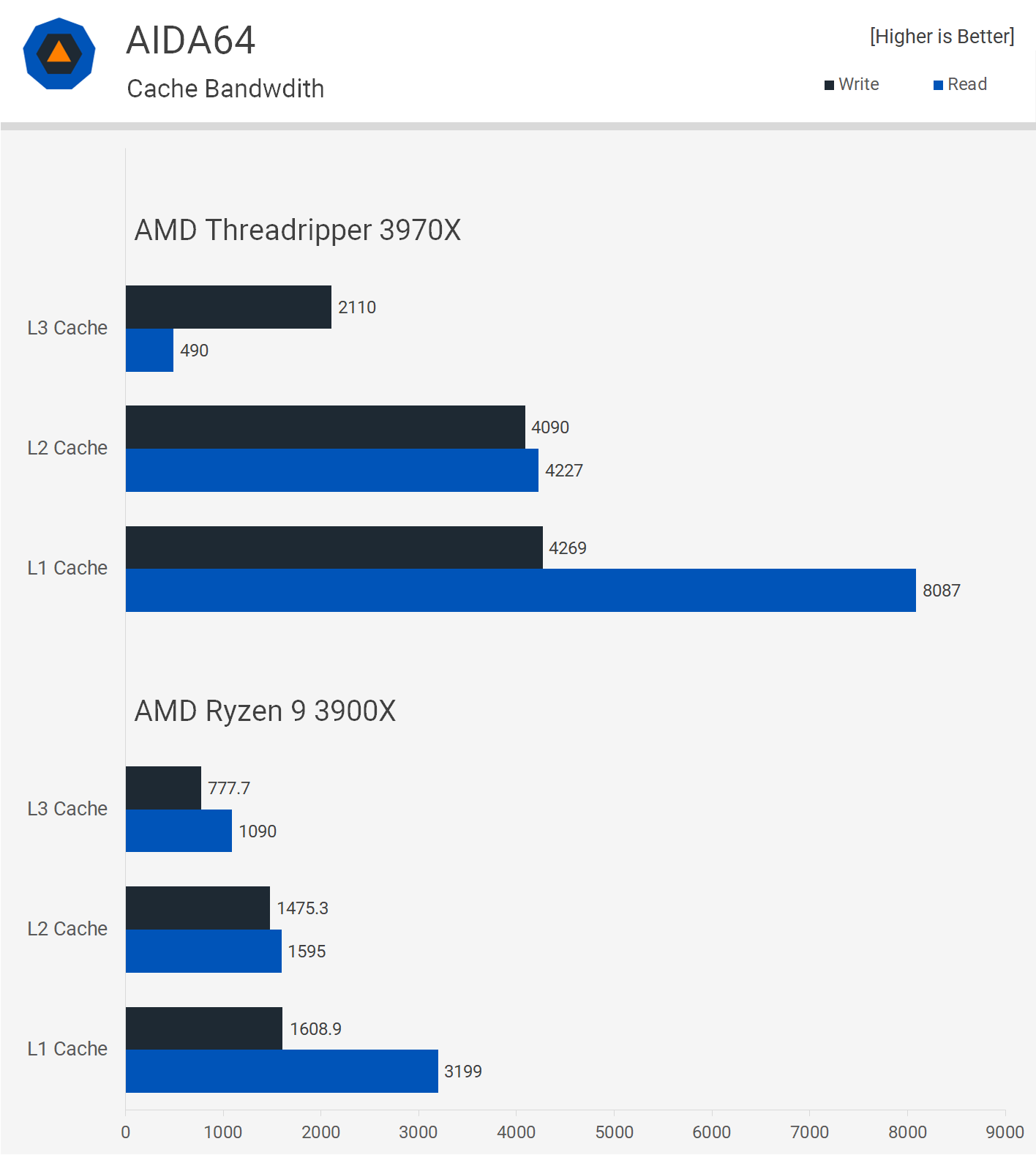
Price vs. Performance
Based on data from the Puget standard export benchmark in Adobe Premiere. Compared to 2nd-gen Threadripper and the 3rd-gen AM4 Ryzen processors, you're certainly paying a hefty premium for new 3rd-gen Threadripper performance.
When compared to Intel's Cascade Lake-X refresh, it's not bad at all. Even at the heavily discounted price tag of $1,000, the Core i9-10980XE struggles to compete, here the 3960X offers more value. The 3970X does command a hefty premium, though it's miles better than the 2990WX.

The margins seen in Cinebench R20 were very similar to what was seen in V-Ray, Blender and Corona, so they're a good representation of the kind of price to performance you can expect to see in these programs.
Shockingly the 3960X offers the same value, or price to performance of the Core i9-9900K, though it's around a 40% markup over the 3rd-gen Ryzen AM4 parts. The 3970X is on par with the Core i9-10980XE and that makes it 31% better value than the 2990WX.
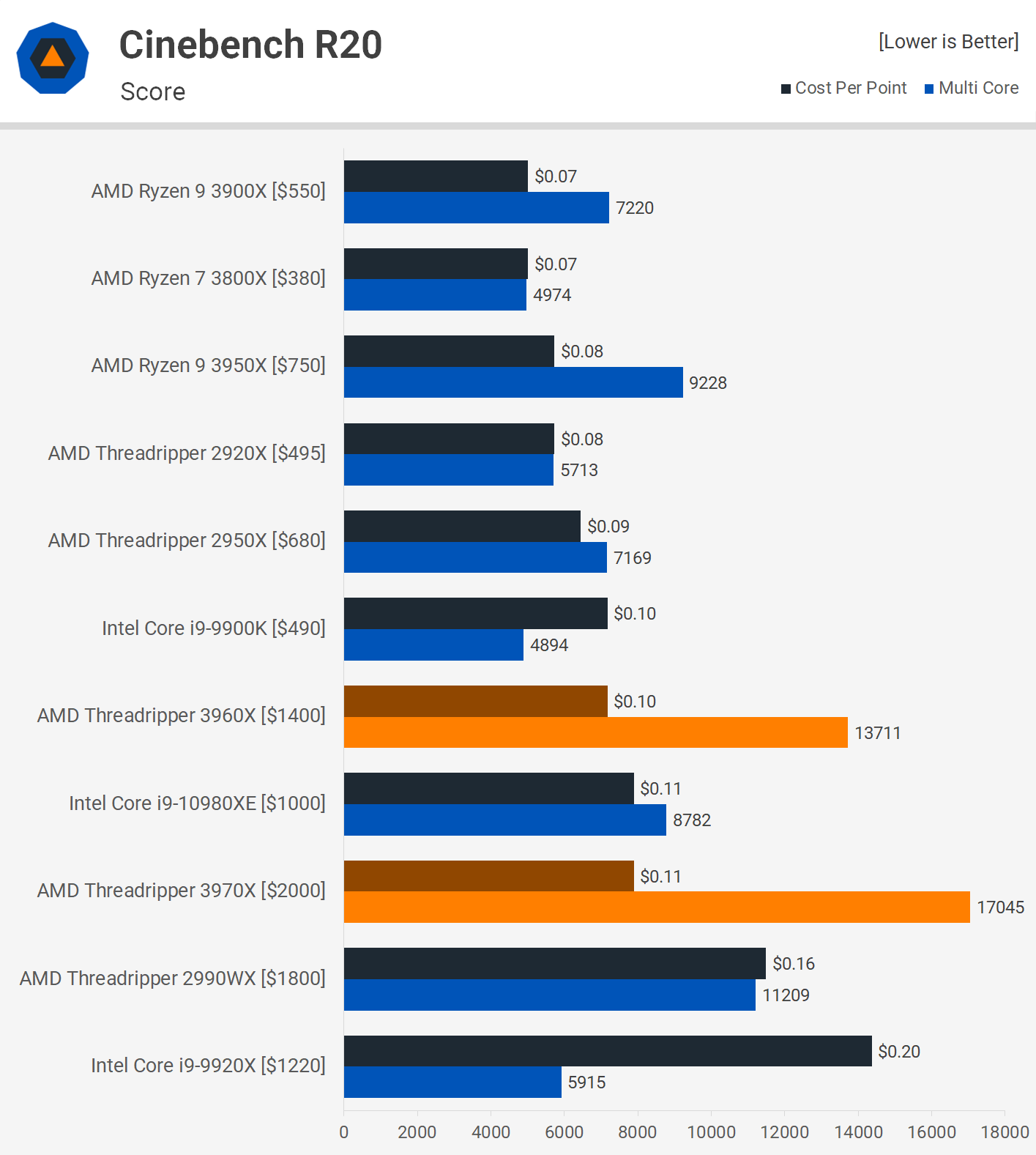
All-New High-end Desktop Beasts
The new 3rd-gen Threadripper CPUs are incredible, high-end desktop beasts. Unlike previous releases, we see no weaknesses with excellent single core performance, and when you've got 24 or 32 of them, that results in mind-blowing multi-core performance.
With solid performance across the board, the only issue that remains now is the price. It's not all that surprising that AMD wants to charge $1,400 for the 24-core model and $2,000 for the 32-core version. The only reason 1st and 2nd-gen Threadripper CPUs were priced so competitively, to the degree that it appeared AMD were massively undercutting Intel, was because in some situations they were inferior.
In this very review we showed you some examples of that. The 10980XE which is a refreshed 9980XE, which was a refreshed 7980XE, was faster than Threadripper 2950X and 2990WX in the 7-zip compression test, Cinebench R20 single core, Premiere encoding, the Puget playback test, V-ray, and in all of the games.
AMD appealed to many power users with accessible HEDT pricing though. The TR 2950X was $900 at launch and now it's down to $680 about a year after release. The Intel 9980XE costs almost $2,200 and even the new 10980XE is set to be listed for $1,000. So clearly AMD offered better value. As far as we can tell, AMD isn't going to axe 2nd-gen Threadripper just yet either, and they will continue to exist alongside the newer and more expensive 3rd-gen Threadripper parts for the foreseeable future.
"A new extreme high-end desktop is born"
In our opinion, with third-gen Threadripper AMD is carving a new category beyond what is offered by 2nd-gen and Intel's Cascade Lake-X which are more your traditional HEDT parts. A new extreme high-end desktop is born, and that's particularly true with the announcement of the Threadripper 3990X, the 64-core, 128-thread processor coming next year with 288 MB of cache.
The topology on third-gen TR ensures equal PCIe and DRAM access for all cores, along with a few other optimizations, meaning the 32-core 3970X doesn't suffer the same fate as the 2990WX, which saw the 2nd-gen part destroy some tests, but get destroyed in others by lower core count CPUs. Also, while they might not be 'gaming' focused CPUs, that doesn't mean a lot of people will want to game with them. Those who were keen on having a Threadripper machine for video editing and then a separate rig for gaming, you can now push the gaming system aside and do everything with either the 3960X or 3970X.
AMD's complete line of CPUs is now as follows: Ryzen 5 3000 series for mainstream computing and gaming, Ryzen 7 for high-end gaming, and Ryzen 9 for high-end gaming and productivity. The 2nd-gen Threadripper parts will become their value HEDT option although the Ryzen 9 3950X at $750 is an incredibly capable 16-core processor that's arguably the best choice for content creators. Especially for those using Premiere, here it was just 16% slower than the latest Threadripper and yet it costs almost 50% less.
The Ryzen 9 3950X also renders Intel's Cascade Lake-X kind of pointless. The 16-core AM4 processor is almost always faster than the more expensive Core i9-10980XE and when it's slower, the margin is slim. The 3950X is also the more consistent performer in games. For those who require more PCIe lanes, the 2950X seems to be the obvious choice now that it's cheaper than the 3950X.
One last word to mention we've gained access to a good number of impressive looking TRX40 motherboards. We used the Gigabyte TRX40 Aorus Xtreme for testing, but we've also got on hand the Aorus Master and MSI's TRX40 Creator. Asus sent along their ROG Zenith Extreme, another truly incredible looking motherboard, and they've also mailed over the Strix TRX40-E and Prime TRX40-Pro. We're about to receive the Asrock TRX40 Taichi, and well, we'll likely be testing them all soon in a VRM thermal roundup. Now if AMD would only confirm what they meant exactly with "long-term" TRX40 socket support.
Shopping Shortcuts:
- AMD Threadripper 3970X on Amazon
- AMD Threadripper 3960X on Amazon
- AMD Ryzen 9 3950X on Amazon
- AMD Ryzen 9 3900X on Amazon
- AMD Ryzen 7 3700X on Amazon
- AMD Ryzen 5 3600 on Amazon
Further Testing
Since we published this review, we have run additional benchmarks and comparisons you may be interested in:
